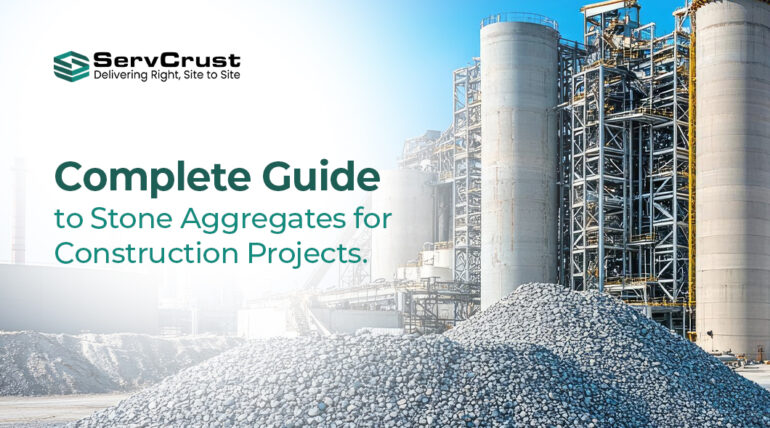
When constructing any reliable structure, from a home to a highway the strength doesn’t start with cement or steel. It starts beneath the surface, with the stone aggregates that make up the bulk of concrete. These materials often go unnoticed, but the quality and type of aggregate used can significantly affect the durability, finish, and overall cost of a project.
If you’re into construction in Telangana or anywhere in India, understanding how to choose the right stone aggregates for construction is critical. This guide breaks down what to look for, and what to avoid, and how to build better.
Why Stone Aggregates Are a Foundation Essential
Stone aggregates aren’t just filler, they perform key structural roles in concrete. Construction stone aggregates distribute load evenly in RCC and concrete foundations. They reduce shrinkage, improve durability, and help control moisture and temperature movement within the mix.
Whether you’re sourcing aggregate materials for building a residential slab or casting a commercial column, poor-quality or mismatched aggregates can lead to issues like cracks, rework, or even structural failure. Many problems with poor quality stone aggregates appear only after curing, when repairs become expensive and time-consuming.
Aggregates are also used beyond vertical structures in highways, drainage layers, base courses, and precast products making them one of the most versatile building materials in India.
Choosing the Right Aggregate for Your Project
Stone aggregates for construction aren’t one-size-fits-all. Your choice should be based on the type of structure, load requirements, and exposure conditions.
For example:
- The best stone aggregates for RCC in India are angular and hard, providing a strong bond with cement.
- Rounded or flaky aggregates reduce bonding and are often unsuitable for structural elements.
- Residential projects may prioritize easy finishing and surface texture.
- While infrastructure like roads and flyovers require graded aggregates that ensure compaction and load distribution.
- This is especially relevant in regions like Telangana and andhra pradesh, where infrastructure demand is rapidly growing and aggregate supply must match both volume and quality.
If you’re unsure how to choose aggregates for building foundation work, start with the basics: look for clean, well-graded crushed stone for construction with appropriate size (usually 20 mm for RCC) and moisture content. Avoid over-sanded mixes or dusty batches, which weaken the concrete matrix.
Factors That Affect Performance and Cost
Beyond size, several factors impact how your aggregates behave in concrete:
- Shape: Angular aggregates provide better interlocking. Flaky or elongated stones reduce structural integrity.
- Dust and fines: Excess dust on stone chips for concrete can prevent proper bonding with cement paste.
- Moisture: Wet aggregates may throw off your water-cement ratio. High moisture content can lead to curing problems or slump issues.
To ensure quality, it’s essential to know how to test aggregates on-site before use. Basic field checks such as rubbing the stone to check for dust or conducting a water absorption test can give you a quick idea of quality. In large projects, lab testing is strongly advised to comply with BIS norms.
Supplier Reliability and Supply Chain Challenges
The importance of a reliable supplier cannot be overstated. A consistent supply of building materials in India is crucial, especially when working on phased timelines or during peak construction seasons.
Batch inconsistency, unwashed stone, and underweight deliveries are red flags. Even more concerning are the issues with aggregate supplier in Telangana and Andhra Pradesh during monsoons. Heavy rains can lead to moisture-laden aggregates, muddy stocks, and delays in delivery, contributing to monsoon construction material challenges that many contractors overlook during planning.
Partnering with certified suppliers who follow industry standards helps reduce risks. Check if the supplier offers regular quality test reports, on-time delivery, and size consistency. Choosing a cheaper but inconsistent vendor may end up costing more due to rework or material wastage.
Build Better by Making Informed Choices
In India’s fast-evolving construction sector, particularly in smart city zones, metro lines, and highways, using the right types of construction aggregates is non-negotiable. Every bag of cement you pour relies on the stability that aggregates provide.
Whether it’s for a house construction or a public project, your material decisions affect your project’s outcome. Ignoring the shape, grading, or moisture of aggregates can weaken structures from the inside out.
Instead, choose wisely. Take time to inspect. Know the difference between good and great aggregates. And when in doubt test.
Need trusted and certified crushed stone aggregates and bricks in Telangana and Andhra Pradesh? Order from ServCrust your local expert for right building materials, delivered on time, every time.
